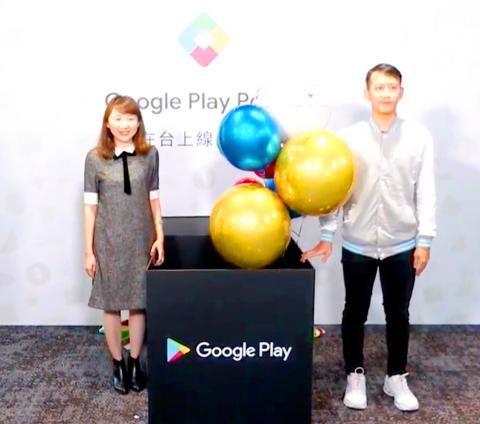Taiwan is to be the fourth nation after Japan, South Korea and the US to enjoy Google Play Points, a reward program that allows users to earn reward points, Google Taiwan announced yesterday.
The program allows “the entire ecosystem of Google Play to take root,” while developers can also use the reward system to drive downloads and exposure of their apps, Google Taiwan general manager Tina Lin (林雅芳) told an online media event.
Google Play Points is a way of giving customers a chance to earn credits on purchases they make in the Google Play store, the company said.

Photo: CNA
The points earned can be used for discounts or special items and content in apps and games, it said.
A points-based reward system is a common practice in the general retail market and is a strategy used by many businesses to help boost customer loyalty, Lin said.
Taiwan is Google Play’s fifth-biggest market in the world, hence the reason for launching the reward program in the nation, she said.
It has a developed consumer market and there is ample demand, she added.
Google Play product marketing manager Liu Ming-wei (劉明維) said that users in Taiwan would get to experience Google Play Points on their mobile devices later this week.

Intel Corp chief executive officer Lip-Bu Tan (陳立武) is expected to meet with Taiwanese suppliers next month in conjunction with the opening of the Computex Taipei trade show, supply chain sources said on Monday. The visit, the first for Tan to Taiwan since assuming his new post last month, would be aimed at enhancing Intel’s ties with suppliers in Taiwan as he attempts to help turn around the struggling US chipmaker, the sources said. Tan is to hold a banquet to celebrate Intel’s 40-year presence in Taiwan before Computex opens on May 20 and invite dozens of Taiwanese suppliers to exchange views

Application-specific integrated circuit designer Faraday Technology Corp (智原) yesterday said that although revenue this quarter would decline 30 percent from last quarter, it retained its full-year forecast of revenue growth of 100 percent. The company attributed the quarterly drop to a slowdown in customers’ production of chips using Faraday’s advanced packaging technology. The company is still confident about its revenue growth this year, given its strong “design-win” — or the projects it won to help customers design their chips, Faraday president Steve Wang (王國雍) told an online earnings conference. “The design-win this year is better than we expected. We believe we will win

Quanta Computer Inc (廣達) chairman Barry Lam (林百里) is expected to share his views about the artificial intelligence (AI) industry’s prospects during his speech at the company’s 37th anniversary ceremony, as AI servers have become a new growth engine for the equipment manufacturing service provider. Lam’s speech is much anticipated, as Quanta has risen as one of the world’s major AI server suppliers. The company reported a 30 percent year-on-year growth in consolidated revenue to NT$1.41 trillion (US$43.35 billion) last year, thanks to fast-growing demand for servers, especially those with AI capabilities. The company told investors in November last year that

Power supply and electronic components maker Delta Electronics Inc (台達電) yesterday said it plans to ship its new 1 megawatt charging systems for electric trucks and buses in the first half of next year at the earliest. The new charging piles, which deliver up to 1 megawatt of charging power, are designed for heavy-duty electric vehicles, and support a maximum current of 1,500 amperes and output of 1,250 volts, Delta said in a news release. “If everything goes smoothly, we could begin shipping those new charging systems as early as in the first half of next year,” a company official said. The new